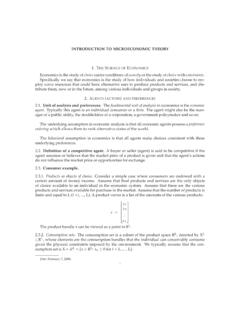Transcription of Introduction to the social contract theory
1 Introduction to the social contract theory1. by Kevin J. Browne social contract theory raises the possibility that the need for social order and certain inherent constraints might provide us with a natural basis for morality. While it might seem that there are strong incentives for social anarchy without an outside objective (and perhaps supernatural) source of morality, according to some philosophers like thomas Hobbes, the incentive is built into the social system by the very nature of our existing among each other. The need naturally exists for us to form some sort of agreement to treat each other with basic respect and follow certain basic rules. That is, we find it most advantageous to form a social contract to base our lives in general and our moral judgments.
2 What would life without such a contract be like? According to Hobbes it wouldn't be pretty! Unbounded liberty can be very dangerous and life without any rules at all would, according to Hobbes, be solitary, nasty, brutish, and short. But why should this be? Can't we just live and let live? In a word the answer is no due to four important factors which together conspire to put us at odds with one another unless we form some sort of social contract to mitigate these factors. 1. Equality of need: We all have certain basic needs in common such as food, clothing, and shelter. 2. Scarcity: Factor one wouldn't really be a problem at all except for factor two which is scarcity. There is not an unlimited supply of food, clothing, and shelter just to name the essentials.
3 Economists know this all too well and often define economics as the study of the scarce alloca- tion of resources which have alternative uses. 3. Equality of human power: Here is the factor that really creates a serious problem when com- bined with factors one and two. For a time, a few can perhaps take control and take what they want at the expense of everyone else. But, in the long run, this power cannot be sustained be- cause one person's weakness is another person's strength. One person may have force on their side, but perhaps others have another advantage. In the end these differences tend to even out which creates a situation where everyone is, in Hobbes' phrasing, at war against everyone else for the same scarce resources. 4. Limited altruism: One solution to the problem is to rely on the kindness of strangers (to para- phrase the famous play).
4 But, this won't work either since we all have limits to how altruistic we are. Let's face it we are not infinitely compassionate towards our fellow human beings. So, taken together these factors create real problems in the absence of any social order or moral rules. How can we prevent these factors from leaving us in the brutish position Hobbes calls the state of nature? What incentive do we have to come together or cooperate in any way to mitigate these factors? The strongest incentive is to avoid the state of nature and the war of all against all . that Hobbes warns us about. To do this we need to establish a mutual agreement that involves two factors. First, that we will not harm one another and second that we will keep our word with one another. These two factors, which Hobbes saw as the primary responsibility of government, would allow us to come together and cooperate socially as well as economically.
5 Escaping the state of nature has its benefits but the social contract does come with a price. We must be willing to give up some of our liberty in order to secure a stable social context. We must 1. give some of our power to a centralized authority to enforce the rules we agree to for not harming one another and keeping our agreements. For Hobbes this central authority had to be very strong and ideally in the hands of one or a few people. Hobbes advocated a monarchy as the best form of government. Other advocates of the social contract like John Locke saw that it was possible to gain the benefits of cooperation within the framework of a democratic republic. Lucky for us, thomas jefferson recognized this as well. As did Madison, who authored many of the Federalist papers which argued for the ratification of our Constitution, which turns out to be a tangible form of the social contract .
6 Interestingly one of the co-authors of these papers, Alexander Hamilton, was more sympathetic to Hobbes' beliefs in the need for strong central government. In either form though, social contract theory says that morality consists in the set of rules, governing how people are to treat one another, that rational people will agree to accept, for their mutual benefit, on the condition that others follow those rules as well.". Another argument for the social contract is known as the prisoner's dilemma. As you've seen from answering the question concerning this, there is a powerful incentive to defect in order to preserve your own interest. Of course, everyone else thinks about it the same way and also defects. But the end result is that we're all worse off than we would have been had we chosen to cooperate.
7 And that's the point. In order to see this we must look beyond the short term consequences of our action to their long term consequences. Again, economists have known this for many years and written eloquently about this. The best example of this is Henry Hazlitt's book Economics in One Lesson where he exposes a lot of faulty thinking in economics and attributes much of it to a specific fallacy which he calls the broken window fallacy. As it turns out this fallacy is very similar to the faulty reasoning many use in the prisoner's dilemma which ends up making them worse off. Briefly, the broken window fallacy occurs when we only look at the short term, visible conse- quences of our action instead of the long term consequences. The name comes from the following story.
8 A shopkeeper becomes the victim of vandalism when a young hoodlum breaks his window. As people gather around the shopkeeper's store they begin to reflect on how unfortunate the inci- dent is. But someone points out that it might be a good thing after all since this way glassmakers stay in business. If it wasn't for broken windows what would glassmakers do for business? So, there has been an economic benefit to the unfortunate incident. From this we might conclude that destruction is a good thing since it creates jobs. What this line of reasoning misses is that the very day the shopkeeper was going to get a new suit from the tailor just down the street. So, now instead of having a window and a new suit the shopkeeper just has a new window. So, there's been no net addition to the economy.
9 In fact there has been a loss overall. Economics is replete with examples of this fallacy and it turns out that the prisoner's dilemma is vulnerable to the same mistake. No one is really better off by defecting and choosing not to cooperate though in the short run it seems that we are better off. And of course this makes sense if we consider that we could end up in a worse situation if we cooperate and the other person defects. We have two choices. Either we act benevolently or we are egoists. Of course, everyone else has this choice as well. While the best situation would be if I were an egoist and everyone else was benevolent, that's very unlikely. What's more likely is that everyone will think this way and we all end up as egoists which is not the worst scenario but only one step better.
10 This, of course, is Hobbes' state of nature. We can improve on this by cooperating. The social contract theory clearly has advantages but also disadvantages. The major benefits 2. to social contract theory are that it provides very clear answers to very difficult questions in ethical theory . For example: What moral rules are we bound to follow and how are those rules justified? Why is it reasonable for us to follow the moral rules? Under what circumstances are we allowed to break the rules? It also seems to provide an objective basis for morality. The major disadvantages involve questions about whether the social contract ever had a basis in history and how it addresses non-participants in the contract . More recent defenders of the social contract such as John Rawls are clear about the fact that the social contract does not necessarily refer to a real historical event.












